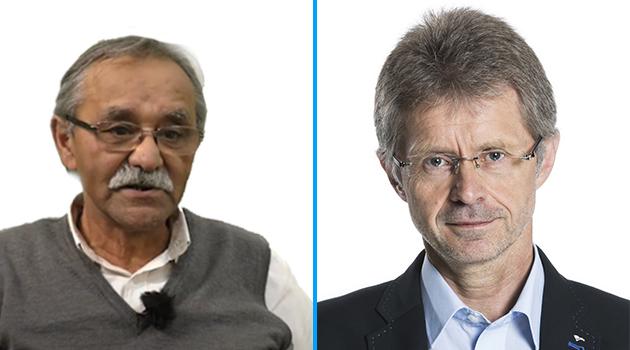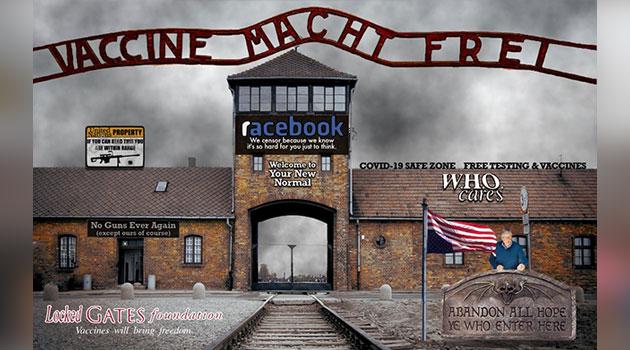Speaker of the Czech Senate and Romani representative on the importance of Holocaust commemoration for ROMEA TV

27 January marked the Day of Holocaust Remembrance and Prevention of Crimes against Humanity in the Czech Republic. The Speaker of the Czech Senate, Miloš Vystrčil, said on that occasion that it is necessary to do more to draw attention to the country’s past and to educate the next generation never to repeat such horrors.
The speaker made his remarks in an exclusive interview for ROMEA TV. In a separate interview, the chair of the Committee for the Redress of the Romani Holocaust, Čeněk Růžička, said politicians who incite the nation against Jewish people or Roma have no business being in politics.
At 10 AM on 27 January, the Federation of Jewish Communities in the Czech Republic and the Foundation for Holocaust Victims, in cooperation with the Office of the Czech Senate and under the auspices of the speaker of the Senate, held their commemorative gathering in the Senate’s main hall. A live broadcast of the ceremony was provided by public broadcaster Czech Television’s ČT24 channel.
The ceremony featured speeches by speaker Vystrčil; chair of the Chamber of Deputies Radek Vondráček; former prisoner in the ghetto at Terezín, Michaela Vidláková; chair of the Committee for the Redress of the Romani Holocaust, Čeněk Růžička; and the chair of the Federation of Jewish Communities in the Czech Republic, Petr Papoušek. A composition by Gideon Klein was performed in concert by David Dorůžka, Robert Fischmann and Martin Novák.
“Both of my parents were in the concentration camps – my mother was at Lety u Písku, and they arrested my father in the Sudetenland and took him straight to Auschwitz. That is why this subject affects me so personally, because a substantial part of my extended family lost their lives at that time,” Mr Růžička told ROMEA TV.
The chair of the Committee for the Redress of the Romani Holocaust also responded to the recent disparaging remarks made by some Czech politicians against the Jewish community or Romani people as well as the recent abuse of the symbol of the Jewish star during demonstrations against the Government. “Politicians who incite the nation against the Roma or the Jews and abuse the memory of Holocaust victims have no business being in politics. I am always angered by this, of course, and speak out critically and sharply against such people. Today I will be speaking about the compensation and redress processes that are undertaken differently with respect to Roma than they are, for example, with respect to the Jewish community deserving of compensation,” he told ROMEA TV.
In his interview with Jarmila Balážová, the speaker of the Senate explained why the upper house is a partner in the annual conference. He also expressed his views of the recent abuse of the symbol of the Star of David at recent demonstrations.
“I consider [the use of that symbol] to be a great shame and a disgrace to the memory of the victims of the Holocaust. This, too, can be caused by the fact that in the past we did not continuously commemorate the memory of these events and memorial sites,” the speaker said in the interview for ROMEA TV.
“In the future we should do more to draw attention to our past andto educate the next generation in such a way that it will not be possible for such things to be repeated. If we do not do so, then evil, which is able to walk right through the doors open to it, will arrive and we will have a problem with different nationalist parties, with various politicians’ remarks distorting the facts. Combating this will then be more difficult,” he told ROMEA TV.
Another commemorative ceremony aiming to publicly support Holocaust surivvors during the global pandemic was scheduled that same afternoon. The Czech-Israeli online meeting entitled “International Holocaust Memorial Day: Remembering, Perpetuating and Pursuing Justice” was organized by the Israeli Foreign Affairs Ministry, the Israeli Ministry for Social Equality, and the Czech Foreign Affairs Ministry.
That meeting was broadcast through the Facebook profile of the Czech Foreign Affairs Ministry. In the evening, the Jewish Museum in Prague and the Jewish Community of Prague held a ceremonial concert at the Spanish Synagogue.
Director of the Jewish Museum Leo Pavlát welcomed those attending, who were addressed by the chair of the Jewish Community in Prague, František Bányai. Compositions by Hans Krása, Josef Mysliveček and Maurice Ravel were performed by the Doležal Quartet.
The concert was accompanied online by a brief virtual tour of the synagogue and its new exhibition. It was to be broadcast through the Jewish Museum’s YouTube channel.
Links to the event were posted to the websites of Jewish Community and Jewish Museum in Prague. Organizers of the three commemorative events came together to jointly present them online with the aim of emphasizing the importance of commemorating the memory of Holocaust victims.
In 2005, 27 January was declared Holocaust Memorial Day by the United Nations to commemorate the millions of victims of the systematic murder and persecution committed by the Nazi regime. The date in January was chosen on the basis of the events of 1945, when Auschwitz-Birkenau, the concentration and extermination camp run by the Nazis, was liberated by the Allies.
More than one million people were murdered at Auschwitz by the close of the Second World War. Holocaust Memorial Day commemorates the six million Jewish victims as well as the Roma, Sinti and others murdered by the Nazis and their supporters.
